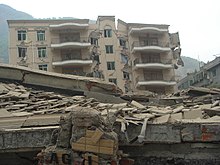Natural disasters in China

Natural disasters in China are the result of several different natural hazards that affect the country according to its particular geographic and geologic features affecting both humans and animals.
Perception of disasters
[edit]Natural disasters reveal the traditional view of disasters as divine retribution: tian zai (天災), literally 'heavenly disaster'.
In ancient beliefs, natural disasters were seen as Heaven's response to immoral human behaviour, whereby the conduct of different individuals carried different weights. While the behaviour of common people ranked last, the actions of bureaucrats had a greater effect.[1] Given that in Imperial China the emperor's behaviour was believed to be the most important, popular belief was that the emperor should attempt to prevent disasters by ensuring his conduct was in following with moral codes – and if a disaster should occur, he was responsible for addressing the consequences. According to the Overseas Development Institute, the state-led nature of humanitarian aid in today's China traces back to these traditional beliefs.[2] Chinese believed that natural disasters would foretell the end of a dynasty or the death of a great leader.
This concept of cosmic linkage between natural disasters and human conduct was radically rejected at the height of Maoist years when nature was represented as ‘an enemy to be overcome, an adversary to be brought to heel’. Propaganda posters were produced with the slogan, "Earthquakes cannot frighten us, the people will certainly conquer nature."[3]
Types
[edit]Earthquakes
[edit]The People's Republic of China established a National Earthquake Administration in 1971 to take charge of monitoring, research, and emergency response for earthquakes. It was renamed China Earthquake Administration (CEA) in 1998, mandated by the Earthquake prevention and Disaster Reduction Act of PRC[4] under the State Council. Each provincial, autonomous regional, and centrally administered municipal government also has its own earthquake administration that is under the direction of CEA.[5]
Famine
[edit]Among the famines in China, the worst ever was the Great Chinese Famine.
Fire
[edit]Flood
[edit]- 1851–1855 Yellow River floods
- 1931 China floods
- 1935 Yangtze flood
- Eastern China flood of 1991
- Shalan Town flood of 2005
- 2007 Shandong coal mine flood
- 2009 Luoding flood
- 2010 China floods
- 2011 China floods
- July 2012 Beijing flood
- 2013 China–Russia floods
- 2013 Southwest China floods
- 2017 China floods
- 2020 China floods
- 2021 China floods
- 2022 China floods
- 2023 China floods
- 2024 Guangdong floods
Plague
[edit]Emergency management
[edit]The National Disaster Reduction Center (NDRC) of the Ministry of Civil Affairs (MCA) is a specialized agency under the Chinese Government engaged in information services and supporting decisions on various natural disasters. It provides reference for disaster-management departments in their decision-making and technical support for China's disaster-reduction undertakings by way of collecting and analyzing disaster information, assessing disasters and emergency relief, and analyzing and studying disasters using such advanced technology as satellite remote sensing.
See also
[edit]References
[edit]- ^ , Elvin, M. ‘Who Was Responsible for the Weather? Moral Meteorology in Late Imperial China’ Science, Technology, and Medicine in East and Southeast Asia, 1998
- ^ Krebs, Hanna B. "Responsibility, legitimacy, morality: Chinese humanitarianism in historical perspective", Overseas Development Institute, September 2014
- ^ Krebs, Hanna B. "Responsibility, legitimacy, morality: Chinese humanitarianism in historical perspective", Overseas Development Institute, September 2014
- ^ Chinese: 《中华人民共和国防震减灾法》
- ^ "Introduction to CEA (中国地震局:机构简介)" (in Chinese). Retrieved 2008-09-21.
External links
[edit]- National Disaster Reduction Center (NDRC), PRC
- Ministry of Civil Affairs (MCA), PRC
- China mulls emergency management law, PRC government web portal
| |||||||||||||
| |||||||||||||
| |||||||||||||
| |||||||||||||
| |||||||||||||
| |||||||||||||
| |||||||||||||
Text is available under the CC BY-SA 4.0 license; additional terms may apply.
Images, videos and audio are available under their respective licenses.
